2022届高考英语二轮复习:动词不定式的七大功能全面总结学案
文档属性
| 名称 | 2022届高考英语二轮复习:动词不定式的七大功能全面总结学案 |
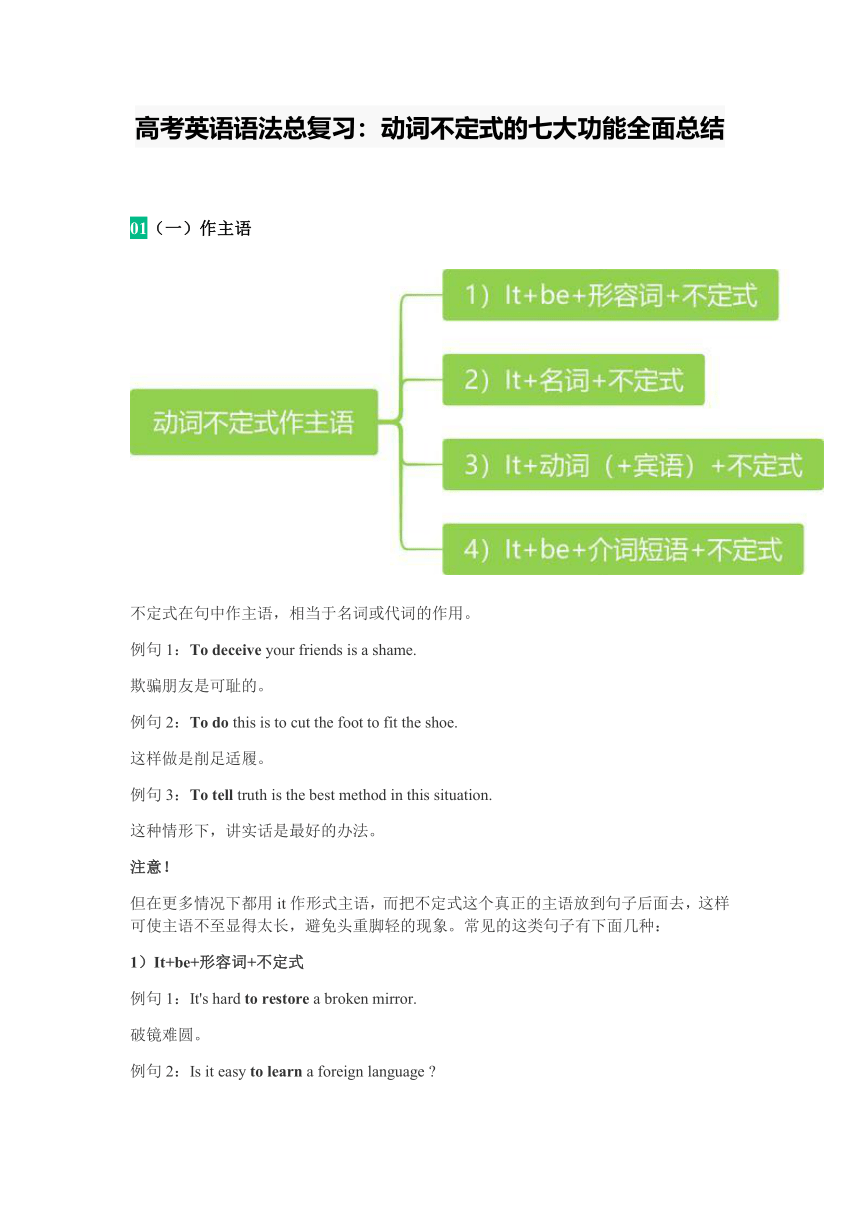
|
|
| 格式 | doc | ||
| 文件大小 | 319.5KB | ||
| 资源类型 | 教案 | ||
| 版本资源 | 通用版 | ||
| 科目 | 英语 | ||
| 更新时间 | 2021-11-20 21:33:17 | ||
图片预览

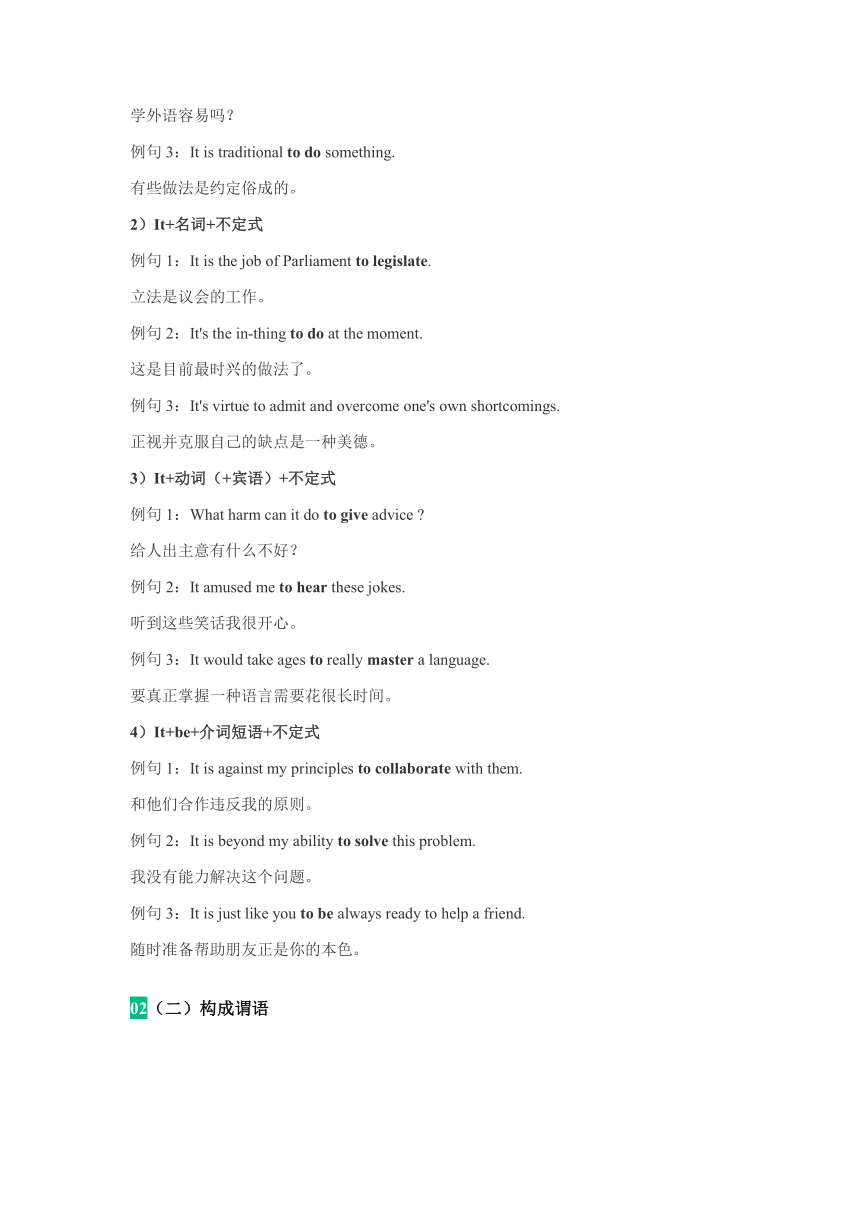
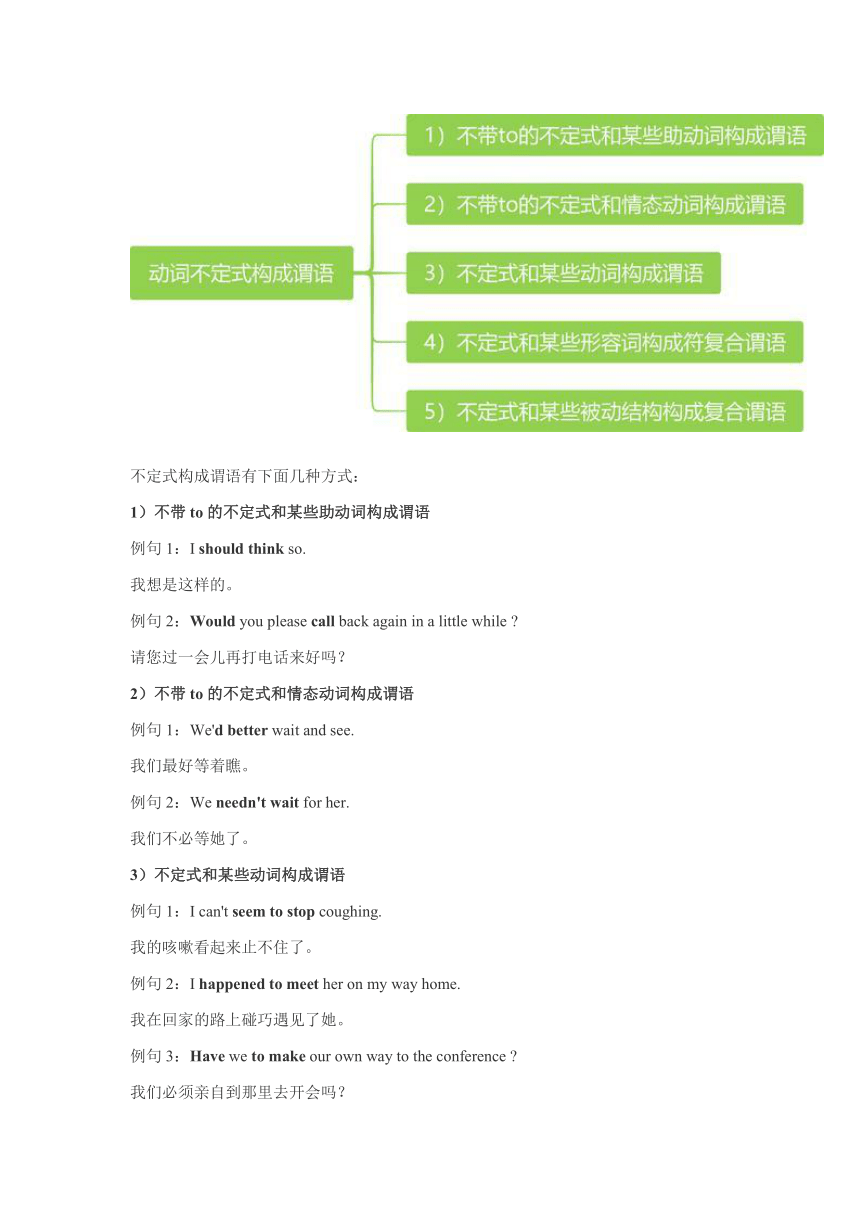
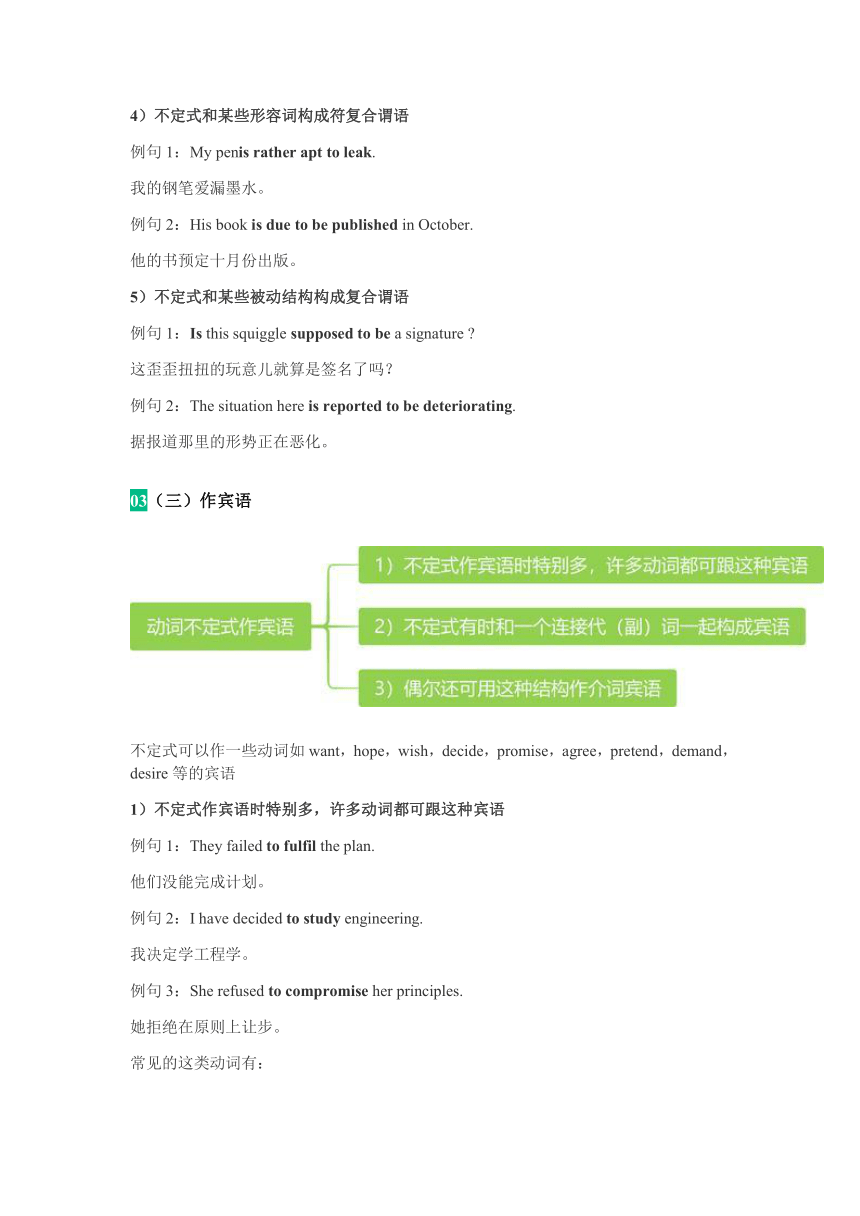
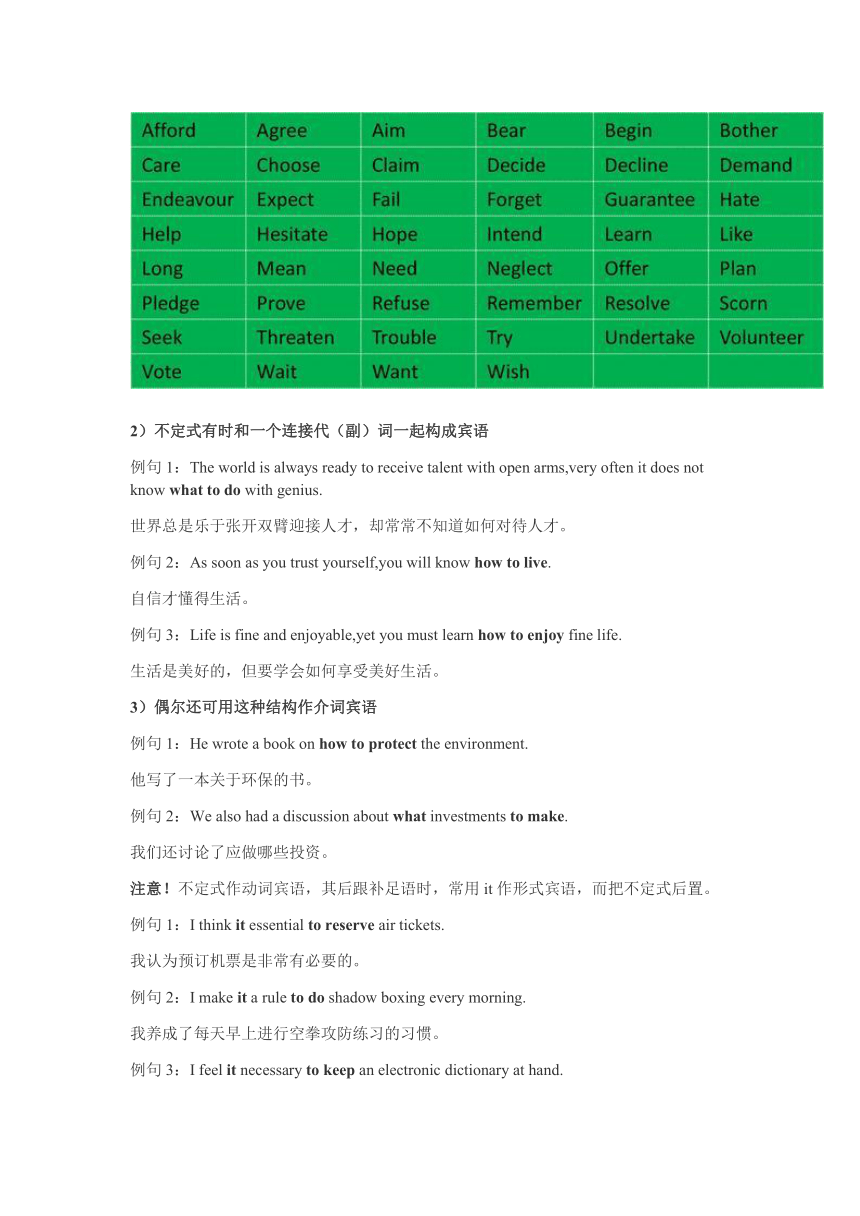
文档简介
高考英语语法总复习:动词不定式的七大功能全面总结
01(一)作主语
不定式在句中作主语,相当于名词或代词的作用。
例句1:To deceive your friends is a shame.
欺骗朋友是可耻的。
例句2:To do this is to cut the foot to fit the shoe.
这样做是削足适履。
例句3:To tell truth is the best method in this situation.
这种情形下,讲实话是最好的办法。
注意!
但在更多情况下都用it作形式主语,而把不定式这个真正的主语放到句子后面去,这样可使主语不至显得太长,避免头重脚轻的现象。常见的这类句子有下面几种:
1)It+be+形容词+不定式
例句1:It's hard to restore a broken mirror.
破镜难圆。
例句2:Is it easy to learn a foreign language
学外语容易吗?
例句3:It is traditional to do something.
有些做法是约定俗成的。
2)It+名词+不定式
例句1:It is the job of Parliament to legislate.
立法是议会的工作。
例句2:It's the in-thing to do at the moment.
这是目前最时兴的做法了。
例句3:It's virtue to admit and overcome one's own shortcomings.
正视并克服自己的缺点是一种美德。
3)It+动词(+宾语)+不定式
例句1:What harm can it do to give advice
给人出主意有什么不好?
例句2:It amused me to hear these jokes.
听到这些笑话我很开心。
例句3:It would take ages to really master a language.
要真正掌握一种语言需要花很长时间。
4)It+be+介词短语+不定式
例句1:It is against my principles to collaborate with them.
和他们合作违反我的原则。
例句2:It is beyond my ability to solve this problem.
我没有能力解决这个问题。
例句3:It is just like you to be always ready to help a friend.
随时准备帮助朋友正是你的本色。
02(二)构成谓语
不定式构成谓语有下面几种方式:
1)不带to的不定式和某些助动词构成谓语
例句1:I should think so.
我想是这样的。
例句2:Would you please call back again in a little while
请您过一会儿再打电话来好吗?
2)不带to的不定式和情态动词构成谓语
例句1:We'd better wait and see.
我们最好等着瞧。
例句2:We needn't wait for her.
我们不必等她了。
3)不定式和某些动词构成谓语
例句1:I can't seem to stop coughing.
我的咳嗽看起来止不住了。
例句2:I happened to meet her on my way home.
我在回家的路上碰巧遇见了她。
例句3:Have we to make our own way to the conference
我们必须亲自到那里去开会吗?
4)不定式和某些形容词构成符复合谓语
例句1:My penis rather apt to leak.
我的钢笔爱漏墨水。
例句2:His book is due to be published in October.
他的书预定十月份出版。
5)不定式和某些被动结构构成复合谓语
例句1:Is this squiggle supposed to be a signature
这歪歪扭扭的玩意儿就算是签名了吗?
例句2:The situation here is reported to be deteriorating.
据报道那里的形势正在恶化。
03(三)作宾语
不定式可以作一些动词如want,hope,wish,decide,promise,agree,pretend,demand,desire等的宾语
1)不定式作宾语时特别多,许多动词都可跟这种宾语
例句1:They failed to fulfil the plan.
他们没能完成计划。
例句2:I have decided to study engineering.
我决定学工程学。
例句3:She refused to compromise her principles.
她拒绝在原则上让步。
常见的这类动词有:
2)不定式有时和一个连接代(副)词一起构成宾语
例句1:The world is always ready to receive talent with open arms,very often it does not know what to do with genius.
世界总是乐于张开双臂迎接人才,却常常不知道如何对待人才。
例句2:As soon as you trust yourself,you will know how to live.
自信才懂得生活。
例句3:Life is fine and enjoyable,yet you must learn how to enjoy fine life.
生活是美好的,但要学会如何享受美好生活。
3)偶尔还可用这种结构作介词宾语
例句1:He wrote a book on how to protect the environment.
他写了一本关于环保的书。
例句2:We also had a discussion about what investments to make.
我们还讨论了应做哪些投资。
注意!不定式作动词宾语,其后跟补足语时,常用it作形式宾语,而把不定式后置。
例句1:I think it essential to reserve air tickets.
我认为预订机票是非常有必要的。
例句2:I make it a rule to do shadow boxing every morning.
我养成了每天早上进行空拳攻防练习的习惯。
例句3:I feel it necessary to keep an electronic dictionary at hand.
我感觉手头带着一本电子词典很有必要。
04(四)作宾语补足语
英语中有很多动词的用法是:“动词+宾语+宾语补足语”,宾语和宾语补足语之间是一种逻辑上的主谓关系。宾语和宾语补足语合起来称作复合宾语。例如:I often hear her sing.我常常听到她唱歌。(作宾语的her实际上又是宾语补足语sing这一动作的发出者。)
能用不定式做宾语补足语的动词很多,根据它们的用法,我们可以把它们分为以下几类:
1)动词+宾语+带to的动词不定式
例句1:Allow me to introduce myself.
请允许我自我介绍一下。
例句2:I,who can not see,find hundreds of things to interest me through mere touch.
我一个盲人,仅靠触摸,就发现数以百计让我感兴趣的东西。
注意!在变为被动句时,由于句中的宾语成为主语,宾语补足语也变成了主语补足语,直接置于已变为被动语态的谓语之后。
例句1:The police aren't allowed to accept rewards.
警察是禁止接受酬谢金的。
例句2:A picture has been said to be something between a thing and a thought.
有人说,画是介乎事物和思想之间的的东西。
例句3:The allied forces were reported to be pushing towards Berlin.
据报道盟军正在向柏林推进。
能这样用的动词很多,常用的有:
Advise,allow,ask,beg,cause,challenge,convince,dare,drive,encourage,expect,forbid,force,hire,instruct,intend,invite,need,order,permit,persuade,remind,require,teach,tell,urge,want,warn
2)表示见解、看法的动词+宾语+不带to的动词不定式
例句:He understood the message to mean that she was not accepting it.
他明白这个消息意味着她不会接受了。
这类动词之后用作宾语补足语的不定式常用to be,而to be往往省略,无论是否是被动语态。但是,如果用作宾语补足语的to be是除一般式之外的其它形式时,不能省略。
例句1:They believed these principles to be universally true.
他们认为这些原则是普遍适用的。
例句2:We knew her to have been a teacher.
我知道她当过老师。
例句3:She was declared (to be) guilty.
她被宣判有罪。
这类动词后的不定式有时可以是完成形式或进行形式,此时的不定式不是be:
例句1:I judge them to have finished.
我估计他们已经干完了。
例句2:They knew the man to have been a spy.
他们知道那人过去当过间谍。
注意!Know的用法
Know用于主动语态,特别是用于一般过去时或完成时态时的时候,其后用作宾语补足语的不定式在英式英语中可以省去to。这时,相当于have been/heard。
例句:I never knew him do anything without a very good reason.
我知道他做任何事情都有充分的理由。
但是,当know用于被动语态时,用作宾语补语的动词不定式前的to不能省去。
例句对比:I have never known that man (to) smile.
That man has never been known to smile.
(我)从未见那个男人笑过。
常这样用的动词有:believe,consider,declare,discover,feel,find,imagine,judge,prove,suppose,think,understand,etc.
3)感官动词+宾语+无to不定式
①一:般用法如下:
例句1:He saw a thief rush out of a shop carrying a bag full of money.
他看到一个贼提着满满一袋子钱从一家商店里跑出来。
例句2:Did you notice a man come in
你注意到有个人进来了吗?
例句3:Did you hear him go out
你听见他走出去了吗?
②这类句子变为被动结构时,不定式前要加to:
例句1:She was seen to enter the building about the time the crime was committed.
有人看见她在案发时进入了这个大楼。
例句2:These regulations were made to protect children.
这些规则是为了保护儿童而制定的。
例句3:He was heard to groan.
有人听见他在呻吟。
③在listen to和look at后面也可跟这种结构:
例句:She listened to us recite the poem.
她听我们背诵那首诗。
④在help后的不定式可加to,也可不加to,但被动结构中要加to:
例句1:A mirror can only help you seethe stain on your face;and to wipe it off,you have to rely on yourself.
镜子只能帮你找到脸上的污点,要擦掉污点得靠自己。
例句2:You'll be helped to fulfill the task.
有人将帮助你完成这项任务。
⑤当感官动词用于被动语态时,一律要用带to的不定式:
例句:They were heard to sing in the next room.
有人听到他们在隔壁唱歌。
常用的感官动词有:see,notice,watch,look at,observe,hear,listen to,feel,smell,etc.
4)使役动词+宾语+无to不定式(get之后要加带to不定式)
①下面三个使役动词虽然都有“使......干......”的意思,但它们之间的含意有一定的差别。
例句1:Jo's reassuring comments made me feel better.
乔说的那些安慰话使我感觉好多了。
例句2:I'll have Hudson show you to your room.
我会让哈德森带你去看你的房间。
例句3:The machine was at last got to start.
这台机器终于开动起来了。
②动词let的含意和用法与上面三个使役动词相近,let之后总是要跟无to的动词不定式,意为“让......”(allow).
例句:Let it be done at once.
这事马上就得做。
5)表示好恶的动词+宾语+带to的不定式
例句1:Their father prefers them to be home early.
他们的父亲更喜欢他们早点回家。
例句2:I would hate my diary to get into the wrong hands.
我不喜欢别人看我的日记。
这类动词包括:
Dislike不喜欢,like喜欢,prefer更喜欢,hate讨厌,love喜爱,want想要
6)动词+介词+宾语+带to的不定式
例句1:I shouted to him to shut the gate.
我大声告诉他把门关上。
例句2:You can rely on me to keep your secret.
你尽管相信我一定为你保密。
例句3:The police appealed to he crowd not to panic.
警方向群众呼吁不要惊慌。
这一类动词中有些不用被动语态,即使是能用被动语态的,也要在其后保留原介词。常这样用的动词有:arrange for,ask for,call (up) on,count on,depend (up) on,long for,prepare for,rely on,wait for,wish for etc.
7)有些动词后可跟先行词it,借此可以构成复合宾语的不定式放在后面
例句1:We consider it our duty to safeguard world peace.
我们认为保卫世界和平是我们的职责。
例句2:I deem it a great honour to be invited to address you.
受邀诸位发表演讲,我感到非常荣幸。
例句3:She regarded it as important to win the competition.
她认为赢得这场比赛很重要。
05(五)作定语
1)不定式在句中也可用作定语,通常放在其所修饰的名词或代词之后,与其所修饰的名词或代词在逻辑上可能是主谓关系
例句1:He was the only one to survive the accident.
他是这次事故中唯一的幸存者。
例句2:She is not a man to bow before difficulties.
她不是一个向困难低头的人。
2)不定式与其所修饰的词之间往往有动宾关系,如果该不定式是不及物动词,或者该不定式本身有宾语,其后应有必要的介词
请注意这里的介词一般不可省去。
例句1:Let's find a more comfortable house to live in.
让我们找一所更舒适的房子住。
例句2:There are a lot of cars to choose from.
有许多汽车可供选择。
例句3:They had many difficulties to reckon with.
他们有许多困难要考虑。
但可以说the time to arrive(到达时间)和a place to live (住处)。美式英语还说a place to go(去处)。
3)有些动词和形容词后常跟不定式,这些动词和形容词派生出来的名词后也可用不定式作定语
例句1:He had no wish to intrude on their privacy.
他原本就不想侵犯他们的隐私。
例句2:He said he had no plans to take a holiday.
他说他没有要休假的计划。
例句3:Her decision to retire surprised us all.
她要退休的决定使我们大为惊讶。
并非所有情况都如此。如动词intend常后接不定式,但与其同源的名词intend则常后跟of doing;动词hope后常跟不定式,但名词hope后则一般接of doing。
4)在个别名词后的不定式与名词之间有同位关系
例句1:Then came the order to evacuate the city.
接着传来撤出城市的命令。
例句2:They had received instructions to protect her.
他们接到指示要保护她。
例句3:The general gave the order to advance.
将军命令部队前进。
请注意下面句子中用作同位语与定语的不定式的特殊位置:
例句:The enemy came close to the town and the order came to evacuate the people.
敌人离城近了,于是发出了疏散市民的命令。
(to evacuate the people置于动词came之后,这显然是因为要使句子平衡的缘故)
5)不定式有时需要用被动形式
例句1:He was the only foreigner to be given such an honour.
他是唯一被授予这项荣誉的外国人。
例句2:There are a lot of things to be done.
有很多事要做。
6)在不少名词后可用不定式作定语
例句1:There is no reason to doubt his word.
没有理由怀疑他的话。
例句2:To scare a bird is not the way to catch it.
吓唬鸟儿不是捕鸟的法子。
例句3:He is filled with a burning ambition to become famous.
他一心想成名。
7)不定式可以修饰作主语的名词,相当于一个定语从句,表明动作即将发生
例句1:That will be the right procedure to follow.
这是应遵循的正当程序。
例句2:Are you going to the banquet to be held on Friday at the embassy
你要去参加星期五大使馆举行的宴会吗?
8)不定式可以和关系代词which连用作定语
例句:He also had a revolver with which to defend himself.
他还有一把防身用的左轮手枪。
9)不定式可以修饰there be结构中作主语的名词
例句1:There is not a moment to lose.
刻不容缓。
例句2:There is nothing to worry about.
没什么好担心的。
10)the first,the second,the last,the best,the only thing等常跟不定式作定语
例句1:I'd be the first to admit I might be wrong.
我愿第一个承认我可能错了。
例句2:He would be the last to accept the proposal.
他绝不会接受这个提议。
06(六)作状语
1)作原因状语
不定式往往放在系表结构的后面,表示产生某种情绪或状态的原因。
例句:We shall be very happy to coordinate with you in the project.
在此项目中与你合作,我们非常高兴。
在这类结构中,不定式的逻辑主语也就是句子的主语。另外,这类形容词有些可变为名词短语。
例句1:We're sorry to hear of your father's death.
听到令尊去世,我们感到非常难过。
例句2:I was somewhat surprised to see him.
见到他我有点吃惊。
常用的这类词有:
Happy,lucky,fortunate,pained,ashamed,surprised,grieved,frightened,shocked,sorry,glad,delighted,eager,disappointed,right,anxious,ready,clever,unwise,quick,foolish,rude,considerate,cruel,wrong,annoyed,bored,astonished,delighted,interested,overjoyed,puzzled,relieved,worried
2)作目的状语
不定式作目的状语时,其动作发生在谓语动词的动作之后,一般放在句尾。但如果要表示强调,也可以位于句首,前面可加in order,但不能用so as。值得注意的是,不定式作目的状语从句,其否定式不能用not+不定式,必须用in order not+不定式或so as not+不定式。
例句1:To succeed,one must first of all believe in himself.
想要成功,首先必须相信自己。
例句2:In order to succeed here you will need to overcome your prejudices.
你需要消除偏见,才能在这里取得成功。
例句3:The beauty of the morning and the radiance of noon are good,but it would be a very silly person who drew the curtains and turned on the light-in order to shut outthe tranquility of the evening.
清晨的美丽和中午的光辉固然好,但如果一个人拉上窗帘,打开电灯试图将黄昏的宁静关在外面,那真是愚蠢的事。
例句4:Fame has also the drawback,that if we pursue it,we must direct our livesso as to please the fancy of men.
名誉也有缺陷,如果我们追求它的话,我们就不得不调整自己的生活以迎合他人所好。
3)作结果状语
不定式表示结果,有时指出乎意料的结果,不定式前常加上only,以加强语气。
例句1:He tried to harm other people,only to ruin himself.
害人终害己。
例句2:The husband left his wife,never to return.
丈夫离开了妻子,再也没回来。
例句3:I arrived at the shop only to find I'd left all my money at home.
我到商店时却发现钱全落在家里了。
例句4:We hurried to the station only to be told that the train had left.
我们急匆匆到达车站,结果被告知火车已开走了。
4)作评论性状语
有些不定式是用来表明说话者的观点和态度的,放在句子之外,修饰整个句子,我们称之为评论性状语。
例句1:To do her justice,we must admit that she did deserve to win.
说句公道话,我们得承认她应该获胜。
例句2:To tell the truth,this is all Greek to me.
说实话,我对此一窍不通。
5)表示评述
下面句子中的不定式也可以看作表示说话者要评述的事实,一般是评述在前,事实在后,评述部分可以用陈述句,也可以用疑问句或感叹句。
例句:He is a coward(评述) to escape from the battlefield (事实).
他从战场逃跑,是个懦夫。
6)表示条件
动词不定式有时也可以表示条件。一般置于句首,否定不定式表示条件多置于句尾。这时,谓语常含有will,shall,should,would,can,must等。
例句:To believe with certainty,we must begin with doubting.
要完全相信,我们首先得怀疑。
07(七)作表语
1)表示目的
例句:My only wish is to do what is best for you.
我唯一的愿望是做对你最有利的事。
2)表示事态发展的结果、预期的结果、不幸的命运或预言
例句:Everyone is to struggle for one's living.
每个人都要为自己的生存奋斗。
3)用于第一人称疑问句,表示征求意见
例句:What are we to do if we fail
如果我们失败了该怎么办?
4)用于被动语态,相当于can(could),should,ought to,must,具有情态意义
例句1:The traffic regulations are to be observed.
必须遵守交通规则。(must be)
例句2:The girl is to be praised for her rapid progress.
这女孩进步很快,应该受到表扬。(should/ought to be)
5)表示“同意,安排,命令,决定,劝告,意愿,禁止”等
例句:Cars are not to park in front of the zoo.
动物园前面不准停放汽车。(禁止)
6)不定式作表语,可用主动形式表示被动意义
例句:The apartment is to let.
该公寓出租。
01(一)作主语
不定式在句中作主语,相当于名词或代词的作用。
例句1:To deceive your friends is a shame.
欺骗朋友是可耻的。
例句2:To do this is to cut the foot to fit the shoe.
这样做是削足适履。
例句3:To tell truth is the best method in this situation.
这种情形下,讲实话是最好的办法。
注意!
但在更多情况下都用it作形式主语,而把不定式这个真正的主语放到句子后面去,这样可使主语不至显得太长,避免头重脚轻的现象。常见的这类句子有下面几种:
1)It+be+形容词+不定式
例句1:It's hard to restore a broken mirror.
破镜难圆。
例句2:Is it easy to learn a foreign language
学外语容易吗?
例句3:It is traditional to do something.
有些做法是约定俗成的。
2)It+名词+不定式
例句1:It is the job of Parliament to legislate.
立法是议会的工作。
例句2:It's the in-thing to do at the moment.
这是目前最时兴的做法了。
例句3:It's virtue to admit and overcome one's own shortcomings.
正视并克服自己的缺点是一种美德。
3)It+动词(+宾语)+不定式
例句1:What harm can it do to give advice
给人出主意有什么不好?
例句2:It amused me to hear these jokes.
听到这些笑话我很开心。
例句3:It would take ages to really master a language.
要真正掌握一种语言需要花很长时间。
4)It+be+介词短语+不定式
例句1:It is against my principles to collaborate with them.
和他们合作违反我的原则。
例句2:It is beyond my ability to solve this problem.
我没有能力解决这个问题。
例句3:It is just like you to be always ready to help a friend.
随时准备帮助朋友正是你的本色。
02(二)构成谓语
不定式构成谓语有下面几种方式:
1)不带to的不定式和某些助动词构成谓语
例句1:I should think so.
我想是这样的。
例句2:Would you please call back again in a little while
请您过一会儿再打电话来好吗?
2)不带to的不定式和情态动词构成谓语
例句1:We'd better wait and see.
我们最好等着瞧。
例句2:We needn't wait for her.
我们不必等她了。
3)不定式和某些动词构成谓语
例句1:I can't seem to stop coughing.
我的咳嗽看起来止不住了。
例句2:I happened to meet her on my way home.
我在回家的路上碰巧遇见了她。
例句3:Have we to make our own way to the conference
我们必须亲自到那里去开会吗?
4)不定式和某些形容词构成符复合谓语
例句1:My penis rather apt to leak.
我的钢笔爱漏墨水。
例句2:His book is due to be published in October.
他的书预定十月份出版。
5)不定式和某些被动结构构成复合谓语
例句1:Is this squiggle supposed to be a signature
这歪歪扭扭的玩意儿就算是签名了吗?
例句2:The situation here is reported to be deteriorating.
据报道那里的形势正在恶化。
03(三)作宾语
不定式可以作一些动词如want,hope,wish,decide,promise,agree,pretend,demand,desire等的宾语
1)不定式作宾语时特别多,许多动词都可跟这种宾语
例句1:They failed to fulfil the plan.
他们没能完成计划。
例句2:I have decided to study engineering.
我决定学工程学。
例句3:She refused to compromise her principles.
她拒绝在原则上让步。
常见的这类动词有:
2)不定式有时和一个连接代(副)词一起构成宾语
例句1:The world is always ready to receive talent with open arms,very often it does not know what to do with genius.
世界总是乐于张开双臂迎接人才,却常常不知道如何对待人才。
例句2:As soon as you trust yourself,you will know how to live.
自信才懂得生活。
例句3:Life is fine and enjoyable,yet you must learn how to enjoy fine life.
生活是美好的,但要学会如何享受美好生活。
3)偶尔还可用这种结构作介词宾语
例句1:He wrote a book on how to protect the environment.
他写了一本关于环保的书。
例句2:We also had a discussion about what investments to make.
我们还讨论了应做哪些投资。
注意!不定式作动词宾语,其后跟补足语时,常用it作形式宾语,而把不定式后置。
例句1:I think it essential to reserve air tickets.
我认为预订机票是非常有必要的。
例句2:I make it a rule to do shadow boxing every morning.
我养成了每天早上进行空拳攻防练习的习惯。
例句3:I feel it necessary to keep an electronic dictionary at hand.
我感觉手头带着一本电子词典很有必要。
04(四)作宾语补足语
英语中有很多动词的用法是:“动词+宾语+宾语补足语”,宾语和宾语补足语之间是一种逻辑上的主谓关系。宾语和宾语补足语合起来称作复合宾语。例如:I often hear her sing.我常常听到她唱歌。(作宾语的her实际上又是宾语补足语sing这一动作的发出者。)
能用不定式做宾语补足语的动词很多,根据它们的用法,我们可以把它们分为以下几类:
1)动词+宾语+带to的动词不定式
例句1:Allow me to introduce myself.
请允许我自我介绍一下。
例句2:I,who can not see,find hundreds of things to interest me through mere touch.
我一个盲人,仅靠触摸,就发现数以百计让我感兴趣的东西。
注意!在变为被动句时,由于句中的宾语成为主语,宾语补足语也变成了主语补足语,直接置于已变为被动语态的谓语之后。
例句1:The police aren't allowed to accept rewards.
警察是禁止接受酬谢金的。
例句2:A picture has been said to be something between a thing and a thought.
有人说,画是介乎事物和思想之间的的东西。
例句3:The allied forces were reported to be pushing towards Berlin.
据报道盟军正在向柏林推进。
能这样用的动词很多,常用的有:
Advise,allow,ask,beg,cause,challenge,convince,dare,drive,encourage,expect,forbid,force,hire,instruct,intend,invite,need,order,permit,persuade,remind,require,teach,tell,urge,want,warn
2)表示见解、看法的动词+宾语+不带to的动词不定式
例句:He understood the message to mean that she was not accepting it.
他明白这个消息意味着她不会接受了。
这类动词之后用作宾语补足语的不定式常用to be,而to be往往省略,无论是否是被动语态。但是,如果用作宾语补足语的to be是除一般式之外的其它形式时,不能省略。
例句1:They believed these principles to be universally true.
他们认为这些原则是普遍适用的。
例句2:We knew her to have been a teacher.
我知道她当过老师。
例句3:She was declared (to be) guilty.
她被宣判有罪。
这类动词后的不定式有时可以是完成形式或进行形式,此时的不定式不是be:
例句1:I judge them to have finished.
我估计他们已经干完了。
例句2:They knew the man to have been a spy.
他们知道那人过去当过间谍。
注意!Know的用法
Know用于主动语态,特别是用于一般过去时或完成时态时的时候,其后用作宾语补足语的不定式在英式英语中可以省去to。这时,相当于have been/heard。
例句:I never knew him do anything without a very good reason.
我知道他做任何事情都有充分的理由。
但是,当know用于被动语态时,用作宾语补语的动词不定式前的to不能省去。
例句对比:I have never known that man (to) smile.
That man has never been known to smile.
(我)从未见那个男人笑过。
常这样用的动词有:believe,consider,declare,discover,feel,find,imagine,judge,prove,suppose,think,understand,etc.
3)感官动词+宾语+无to不定式
①一:般用法如下:
例句1:He saw a thief rush out of a shop carrying a bag full of money.
他看到一个贼提着满满一袋子钱从一家商店里跑出来。
例句2:Did you notice a man come in
你注意到有个人进来了吗?
例句3:Did you hear him go out
你听见他走出去了吗?
②这类句子变为被动结构时,不定式前要加to:
例句1:She was seen to enter the building about the time the crime was committed.
有人看见她在案发时进入了这个大楼。
例句2:These regulations were made to protect children.
这些规则是为了保护儿童而制定的。
例句3:He was heard to groan.
有人听见他在呻吟。
③在listen to和look at后面也可跟这种结构:
例句:She listened to us recite the poem.
她听我们背诵那首诗。
④在help后的不定式可加to,也可不加to,但被动结构中要加to:
例句1:A mirror can only help you seethe stain on your face;and to wipe it off,you have to rely on yourself.
镜子只能帮你找到脸上的污点,要擦掉污点得靠自己。
例句2:You'll be helped to fulfill the task.
有人将帮助你完成这项任务。
⑤当感官动词用于被动语态时,一律要用带to的不定式:
例句:They were heard to sing in the next room.
有人听到他们在隔壁唱歌。
常用的感官动词有:see,notice,watch,look at,observe,hear,listen to,feel,smell,etc.
4)使役动词+宾语+无to不定式(get之后要加带to不定式)
①下面三个使役动词虽然都有“使......干......”的意思,但它们之间的含意有一定的差别。
例句1:Jo's reassuring comments made me feel better.
乔说的那些安慰话使我感觉好多了。
例句2:I'll have Hudson show you to your room.
我会让哈德森带你去看你的房间。
例句3:The machine was at last got to start.
这台机器终于开动起来了。
②动词let的含意和用法与上面三个使役动词相近,let之后总是要跟无to的动词不定式,意为“让......”(allow).
例句:Let it be done at once.
这事马上就得做。
5)表示好恶的动词+宾语+带to的不定式
例句1:Their father prefers them to be home early.
他们的父亲更喜欢他们早点回家。
例句2:I would hate my diary to get into the wrong hands.
我不喜欢别人看我的日记。
这类动词包括:
Dislike不喜欢,like喜欢,prefer更喜欢,hate讨厌,love喜爱,want想要
6)动词+介词+宾语+带to的不定式
例句1:I shouted to him to shut the gate.
我大声告诉他把门关上。
例句2:You can rely on me to keep your secret.
你尽管相信我一定为你保密。
例句3:The police appealed to he crowd not to panic.
警方向群众呼吁不要惊慌。
这一类动词中有些不用被动语态,即使是能用被动语态的,也要在其后保留原介词。常这样用的动词有:arrange for,ask for,call (up) on,count on,depend (up) on,long for,prepare for,rely on,wait for,wish for etc.
7)有些动词后可跟先行词it,借此可以构成复合宾语的不定式放在后面
例句1:We consider it our duty to safeguard world peace.
我们认为保卫世界和平是我们的职责。
例句2:I deem it a great honour to be invited to address you.
受邀诸位发表演讲,我感到非常荣幸。
例句3:She regarded it as important to win the competition.
她认为赢得这场比赛很重要。
05(五)作定语
1)不定式在句中也可用作定语,通常放在其所修饰的名词或代词之后,与其所修饰的名词或代词在逻辑上可能是主谓关系
例句1:He was the only one to survive the accident.
他是这次事故中唯一的幸存者。
例句2:She is not a man to bow before difficulties.
她不是一个向困难低头的人。
2)不定式与其所修饰的词之间往往有动宾关系,如果该不定式是不及物动词,或者该不定式本身有宾语,其后应有必要的介词
请注意这里的介词一般不可省去。
例句1:Let's find a more comfortable house to live in.
让我们找一所更舒适的房子住。
例句2:There are a lot of cars to choose from.
有许多汽车可供选择。
例句3:They had many difficulties to reckon with.
他们有许多困难要考虑。
但可以说the time to arrive(到达时间)和a place to live (住处)。美式英语还说a place to go(去处)。
3)有些动词和形容词后常跟不定式,这些动词和形容词派生出来的名词后也可用不定式作定语
例句1:He had no wish to intrude on their privacy.
他原本就不想侵犯他们的隐私。
例句2:He said he had no plans to take a holiday.
他说他没有要休假的计划。
例句3:Her decision to retire surprised us all.
她要退休的决定使我们大为惊讶。
并非所有情况都如此。如动词intend常后接不定式,但与其同源的名词intend则常后跟of doing;动词hope后常跟不定式,但名词hope后则一般接of doing。
4)在个别名词后的不定式与名词之间有同位关系
例句1:Then came the order to evacuate the city.
接着传来撤出城市的命令。
例句2:They had received instructions to protect her.
他们接到指示要保护她。
例句3:The general gave the order to advance.
将军命令部队前进。
请注意下面句子中用作同位语与定语的不定式的特殊位置:
例句:The enemy came close to the town and the order came to evacuate the people.
敌人离城近了,于是发出了疏散市民的命令。
(to evacuate the people置于动词came之后,这显然是因为要使句子平衡的缘故)
5)不定式有时需要用被动形式
例句1:He was the only foreigner to be given such an honour.
他是唯一被授予这项荣誉的外国人。
例句2:There are a lot of things to be done.
有很多事要做。
6)在不少名词后可用不定式作定语
例句1:There is no reason to doubt his word.
没有理由怀疑他的话。
例句2:To scare a bird is not the way to catch it.
吓唬鸟儿不是捕鸟的法子。
例句3:He is filled with a burning ambition to become famous.
他一心想成名。
7)不定式可以修饰作主语的名词,相当于一个定语从句,表明动作即将发生
例句1:That will be the right procedure to follow.
这是应遵循的正当程序。
例句2:Are you going to the banquet to be held on Friday at the embassy
你要去参加星期五大使馆举行的宴会吗?
8)不定式可以和关系代词which连用作定语
例句:He also had a revolver with which to defend himself.
他还有一把防身用的左轮手枪。
9)不定式可以修饰there be结构中作主语的名词
例句1:There is not a moment to lose.
刻不容缓。
例句2:There is nothing to worry about.
没什么好担心的。
10)the first,the second,the last,the best,the only thing等常跟不定式作定语
例句1:I'd be the first to admit I might be wrong.
我愿第一个承认我可能错了。
例句2:He would be the last to accept the proposal.
他绝不会接受这个提议。
06(六)作状语
1)作原因状语
不定式往往放在系表结构的后面,表示产生某种情绪或状态的原因。
例句:We shall be very happy to coordinate with you in the project.
在此项目中与你合作,我们非常高兴。
在这类结构中,不定式的逻辑主语也就是句子的主语。另外,这类形容词有些可变为名词短语。
例句1:We're sorry to hear of your father's death.
听到令尊去世,我们感到非常难过。
例句2:I was somewhat surprised to see him.
见到他我有点吃惊。
常用的这类词有:
Happy,lucky,fortunate,pained,ashamed,surprised,grieved,frightened,shocked,sorry,glad,delighted,eager,disappointed,right,anxious,ready,clever,unwise,quick,foolish,rude,considerate,cruel,wrong,annoyed,bored,astonished,delighted,interested,overjoyed,puzzled,relieved,worried
2)作目的状语
不定式作目的状语时,其动作发生在谓语动词的动作之后,一般放在句尾。但如果要表示强调,也可以位于句首,前面可加in order,但不能用so as。值得注意的是,不定式作目的状语从句,其否定式不能用not+不定式,必须用in order not+不定式或so as not+不定式。
例句1:To succeed,one must first of all believe in himself.
想要成功,首先必须相信自己。
例句2:In order to succeed here you will need to overcome your prejudices.
你需要消除偏见,才能在这里取得成功。
例句3:The beauty of the morning and the radiance of noon are good,but it would be a very silly person who drew the curtains and turned on the light-in order to shut outthe tranquility of the evening.
清晨的美丽和中午的光辉固然好,但如果一个人拉上窗帘,打开电灯试图将黄昏的宁静关在外面,那真是愚蠢的事。
例句4:Fame has also the drawback,that if we pursue it,we must direct our livesso as to please the fancy of men.
名誉也有缺陷,如果我们追求它的话,我们就不得不调整自己的生活以迎合他人所好。
3)作结果状语
不定式表示结果,有时指出乎意料的结果,不定式前常加上only,以加强语气。
例句1:He tried to harm other people,only to ruin himself.
害人终害己。
例句2:The husband left his wife,never to return.
丈夫离开了妻子,再也没回来。
例句3:I arrived at the shop only to find I'd left all my money at home.
我到商店时却发现钱全落在家里了。
例句4:We hurried to the station only to be told that the train had left.
我们急匆匆到达车站,结果被告知火车已开走了。
4)作评论性状语
有些不定式是用来表明说话者的观点和态度的,放在句子之外,修饰整个句子,我们称之为评论性状语。
例句1:To do her justice,we must admit that she did deserve to win.
说句公道话,我们得承认她应该获胜。
例句2:To tell the truth,this is all Greek to me.
说实话,我对此一窍不通。
5)表示评述
下面句子中的不定式也可以看作表示说话者要评述的事实,一般是评述在前,事实在后,评述部分可以用陈述句,也可以用疑问句或感叹句。
例句:He is a coward(评述) to escape from the battlefield (事实).
他从战场逃跑,是个懦夫。
6)表示条件
动词不定式有时也可以表示条件。一般置于句首,否定不定式表示条件多置于句尾。这时,谓语常含有will,shall,should,would,can,must等。
例句:To believe with certainty,we must begin with doubting.
要完全相信,我们首先得怀疑。
07(七)作表语
1)表示目的
例句:My only wish is to do what is best for you.
我唯一的愿望是做对你最有利的事。
2)表示事态发展的结果、预期的结果、不幸的命运或预言
例句:Everyone is to struggle for one's living.
每个人都要为自己的生存奋斗。
3)用于第一人称疑问句,表示征求意见
例句:What are we to do if we fail
如果我们失败了该怎么办?
4)用于被动语态,相当于can(could),should,ought to,must,具有情态意义
例句1:The traffic regulations are to be observed.
必须遵守交通规则。(must be)
例句2:The girl is to be praised for her rapid progress.
这女孩进步很快,应该受到表扬。(should/ought to be)
5)表示“同意,安排,命令,决定,劝告,意愿,禁止”等
例句:Cars are not to park in front of the zoo.
动物园前面不准停放汽车。(禁止)
6)不定式作表语,可用主动形式表示被动意义
例句:The apartment is to let.
该公寓出租。
